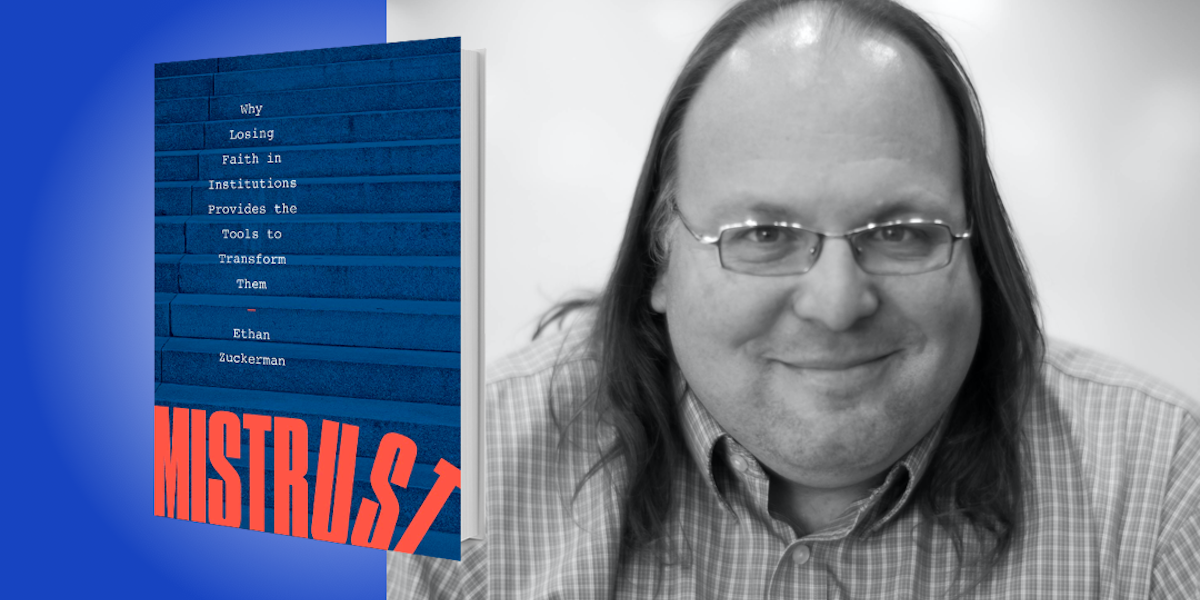Ethan Zuckerman is the founder of the Institute for Digital Public Infrastructure at the University of Massachusetts Amherst, where he is an associate professor of public policy, information, and communication. From 2011 to 2020, he led the Center for Civic Media at the MIT Media Lab, and he is also cofounder of the international blogging community Global Voices.
Below, Ethan shares 5 key insights from his new book, Mistrust: Why Losing Faith in Institutions Provides the Tools to Transform Them. Download the Next Big Idea App to enjoy more audio “Book Bites,” plus Ideas of the Day, ad-free podcast episodes, and more.
1. Politics today is about mistrust.
In the 1960s, four out of five Americans surveyed told pollsters that they trusted the government to do the right thing all or most of the time. But in the last decade, fewer than one in five Americans said they trusted the government. And it’s not just Washington—Americans have lost trust in large institutions of all sorts, from banks and churches to the media and the healthcare system. We see the results everywhere, from people who are resisting the coronavirus vaccine, to supporters of Donald Trump who believe that a “deep state” manipulated the 2020 election. Mistrust toward institutions is now our default stance, and it’s transforming how politics and civics work in the U.S. and around the world.
2. Don’t let mistrust paralyze you.
The danger of mistrusting institutions is that you can lose your ability to influence them. If you assume the government is corrupt, you either give up on it entirely, or you become vulnerable to demagogues who promise that they, personally, can change things. Both of these are traps that will make you helpless. Instead, the key is to learn how to make effective social change, even when you don’t trust the institutions that are supposed to govern society. The Black Panther Party, for example, built their own schools and public health programs instead of relying on programs that weren’t serving black populations. In this way, deciding that you don’t trust an institution can be a first step toward building new systems that work better.
“In the last decade, fewer than one in five Americans said they trusted the government.”
3. Expand your toolkit.
Activists often take inspiration from the civil rights movement, when protests led to new legislation that recognized the rights of Americans who had been subjugated. As a result, many of the people who work to change society today are lawyers, and they consider changing laws to be the most effective way of changing society.
But law is only one tool in a much broader toolkit; you can make social change through markets, for example, creating new products like electric cars or home solar panels that reduce our dependence on fossil fuels. You can make change through social norms, as the Black Lives Matter movement has done, forcing institutions to confront their embedded biases. You can even make change with technology—a remarkable programmer named Moxie Marlinspike created an encrypted messaging system that the NSA can’t eavesdrop on. He then integrated it into WhatsApp, giving hundreds of millions of people a way to protect their communications from the government.
“Deciding that you don’t trust an institution can be a first step toward building new systems that work better.”
4. Social media can give us superpowers.
Trying to make change via social media is often dismissed as a waste of time, but where social media can be very powerful is in shaping social norms. Consider the Me Too movement, which started online and involved thousands of women telling their stories about sexual abuse. Combating sexual harassment didn’t require a change in law—it’s been illegal for years. What it required was a change in norms to become something that institutions were forced to address instead of sweeping it under the rug. Social media allowed ordinary individuals to change the narrative about abuse, leading to real change in workplaces around the world.
5. It’s hard to overthrow institutions.
Institutionalists try to steer institutions in the right direction, while insurrectionists believe that some institutions need to be overthrown and replaced. It’s certainly sexier to think of yourself as a revolutionary, but the last four years of U.S. politics have shown how important it is to have resilient institutions, so that a president can’t simply appoint Supreme Court justices who overturn an election he loses. So one powerful strategy for change is trying to bring institutions back to their founding values. For example, we could turn the House of Representatives back into the “people’s house” by electing 10,000 new representatives, thereby returning to George Washington’s idea that people should have a personal relationship with someone who advances their interests in the nation’s capital.
For more Book Bites, download the Next Big Idea App today:

































